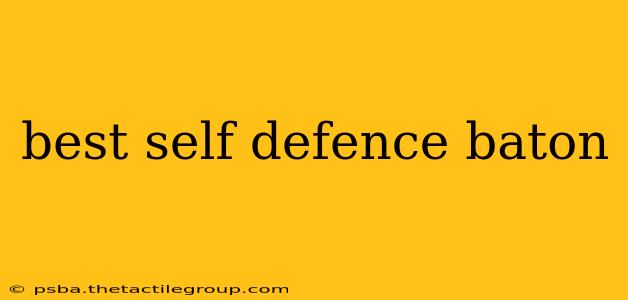Choosing the right self-defense baton can be overwhelming. The market offers a wide array of materials, lengths, and features, each with its own pros and cons. This guide will help you navigate the options and select the best self-defense baton for your needs, focusing on safety, legality, and effectiveness. Remember, carrying and using a baton for self-defense involves legal ramifications, so always check your local laws and regulations before purchasing or carrying one.
Factors to Consider When Choosing a Self-Defense Baton
Before diving into specific baton types, let's outline the key factors to consider:
1. Material:
-
Steel: Steel batons are incredibly durable and offer superior strength. They're ideal for serious self-defense situations but can be heavier and more expensive. Look for high-carbon steel for optimal strength and resilience.
-
Aluminum: Aluminum batons offer a good balance of strength, weight, and cost. They're lighter than steel but may not be as durable against repeated impacts. Anodized aluminum provides added protection against corrosion.
-
Composite Materials: These batons often use a combination of materials like fiberglass or polymers, resulting in lightweight and durable options. However, their strength might not match that of steel or even high-quality aluminum.
2. Length:
The optimal length depends on your height, reach, and intended use. Longer batons offer greater reach but can be less maneuverable in close quarters. Shorter batons are more easily concealed and easier to control, but they offer less reach. Consider experimenting with different lengths to find what feels most comfortable and effective for you.
3. Design Features:
-
Expandable Batons: These batons collapse for easy storage and concealment, then extend to their full length with a flick of the wrist. They are popular but can sometimes jam or malfunction under pressure.
-
Fixed-Length Batons: These batons are always at their full length, making them simple and reliable. They're generally more robust than expandable batons.
-
Grip: A comfortable and secure grip is essential. Look for batons with textured grips or ergonomic designs to prevent slippage.
-
Weight: Consider the baton's weight carefully. A heavier baton offers more impact force but can be more tiring to wield for extended periods. A lighter baton is easier to maneuver but may lack stopping power.
4. Legal Considerations:
This is crucial. Laws regarding self-defense weapons vary significantly by location. Some areas restrict or outright ban the carrying of batons. Before purchasing any self-defense baton, thoroughly research the laws in your area. Ignorance of the law is not a defense.
Types of Self-Defense Batons
While there's no single "best" baton, understanding the different types helps you make an informed decision:
1. Expandable Batons (Telescopic Batons):
Popular for their concealability, expandable batons are designed to extend quickly from a compact size. However, their reliability can be a concern; ensure you choose a reputable brand known for its quality.
2. Fixed-Length Batons:
These offer consistent strength and reliability. Their fixed length allows for predictable handling, making them a good choice for those prioritizing dependability.
3. ASP Batons:
Often made of steel, ASP batons are known for their robust construction and durable design. They typically feature a textured grip for improved control.
Choosing the Right Baton for You
The "best" self-defense baton is highly subjective and depends heavily on your individual needs and circumstances. Consider your physical capabilities, the potential threats you face, and local laws before making a purchase.
Beyond the Baton: Self-Defense Training
It's crucial to understand that a baton is merely a tool. Effective self-defense requires training. Consider taking a self-defense course to learn proper baton techniques, situational awareness, and de-escalation strategies. This will significantly enhance your safety and effectiveness.
Disclaimer: This information is for educational purposes only and does not constitute legal or professional advice. Always consult with relevant authorities and experts before making decisions regarding self-defense. Improper use of a self-defense baton can lead to serious injury or legal repercussions.

